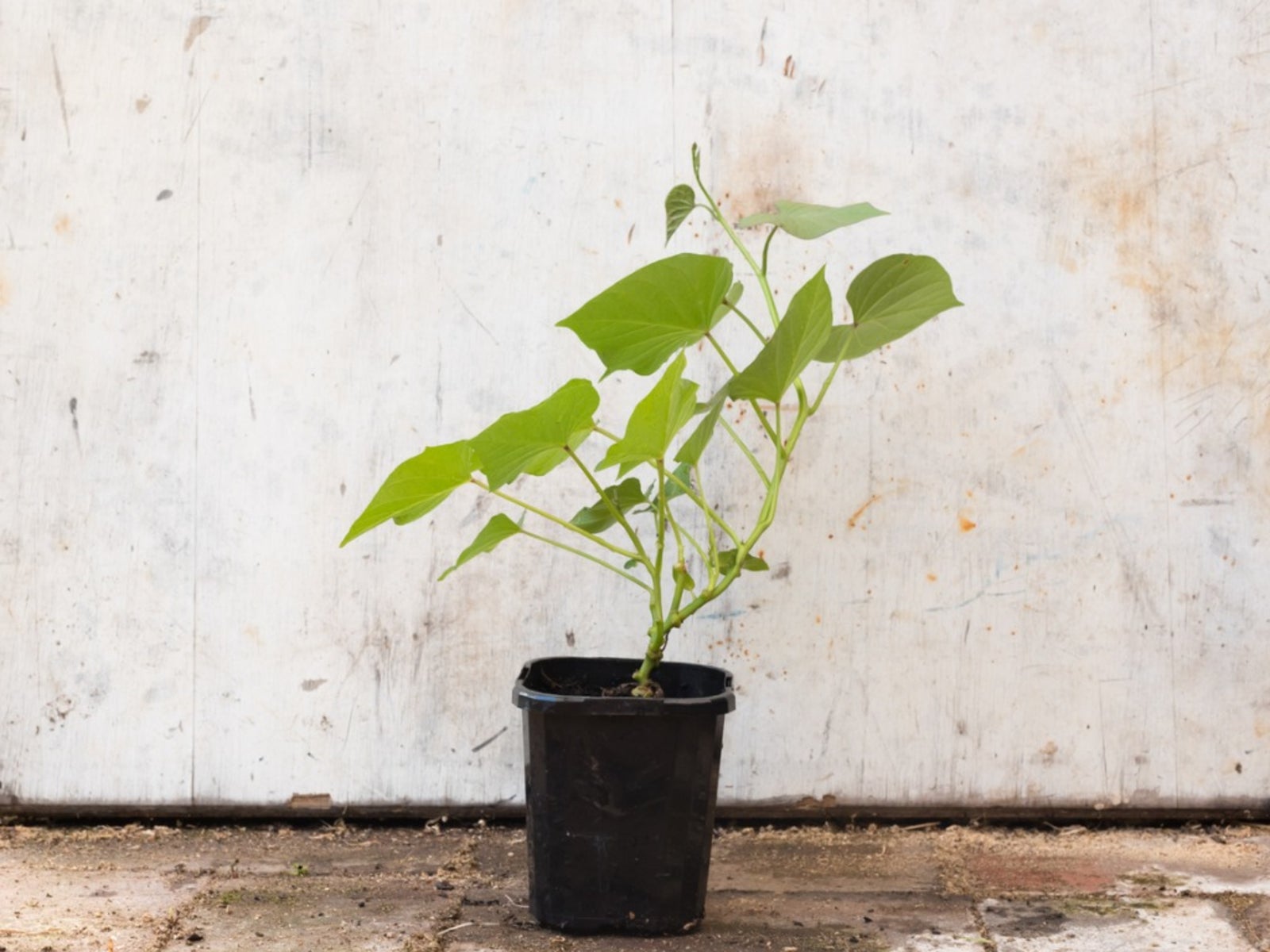
Sign up for the Gardening Know How newsletter today and receive a free copy of our e-book "How to Grow Delicious Tomatoes".
You are now subscribed
Your newsletter sign-up was successful
A perennial in its native environment, growing sweet potatoes in containers is actually an easy endeavor but the plant is usually grown as an annual this way. Sweet potatoes are highly nutritious and come in two different varieties -- dry flesh types and moist flesh types. The moist fleshed types convert more starch to sugars when cooked, thus becoming softer and sweeter than their dry kin and are more often referred to as yams, although true yams can only be cultivated in tropical climes. Either variety has roots variously hued from white to orange to red, depending on the cultivar. With its trailing vine, the sweet potato has a root system that trails down into the soil along this vine. When harvesting sweet potatoes in pots or in the garden, some of these roots swell and form the storage root, which is the part of the plant we harvest and eat.
How to Grow Sweet Potatoes in a Container - Producing Slips
Whether grown in the garden or as container grown sweet potatoes, these vegetables prefer warm days and nights and are planted from slips or transplants. Slips or transplants for growing sweet potatoes in a container may be purchased from the local nursery or grown yourself. Be sure to select bush varieties, which produce shorter vines when growing a potted sweet potato plant. Likely varieties for sweet potato container crops are Puerto Rico and Vardaman. Avoid grocery store purchased sweet potatoes, as there is no way of knowing what variety they are, what climate they are most suited to, or if they harbor disease. To grow your own slips for sweet potato container crops, select an unblemished, smooth root of about 1 ½ inches (4 cm.) in diameter from the last year's harvest. Each root produces several slips. Put the selected root in clean sand and cover with an additional 2 inches (5 cm.). Water thoroughly and regularly while keeping the temperature between 75 and 80 degrees F. (24-27 C.) when rooting. Slips are ready in six weeks or when six to ten leaves have sprouted, whereupon you will then gently separate the slips from the seed root. You are now ready to plant your container grown sweet potatoes.
Planting Sweet Potato Container Crops
When growing a potted sweet potato plant, the first thing to consider is the choice of a suitable container. Avoid plastic or metal containers, but clay is great and a whiskey barrel makes a fine choice. Be sure the pot has four or more holes for drainage. Potted sweet potatoes prefer well-draining, sandy soil to which you should add compost. Plant your yam slips 12 inches (31 cm.) apart. Keep the potted sweet potato start indoors for 12 weeks before moving it outside, at least four weeks after the last frost. Water the potted sweet potato once a week or as needed depending on rainfall. Do not overwater!
Harvesting Container Grown Sweet Potatoes
Container grown sweet potatoes should be ready for harvest after 150 days and certainly just after a vine killing frost. Gently dig up with a garden fork and allow drying and curing for ten days, ideally in an area with a temperature of 80 to 85 degrees F. (27-29 C.) (possibly near a furnace) and with high relative humidity. To increase the humidity, place the sweet potatoes in boxes or crates and cover them with paper or cloth or pack in perforated plastic bags. Store in a cool, dry place between 55 and 60 degrees F. (13-16 C.). You may also freeze or can the resulting container grown sweet potatoes if desired.
Sign up for the Gardening Know How newsletter today and receive a free copy of our e-book "How to Grow Delicious Tomatoes".

Amy Grant has been gardening for 30 years and writing for 15. A professional chef and caterer, Amy's area of expertise is culinary gardening.
